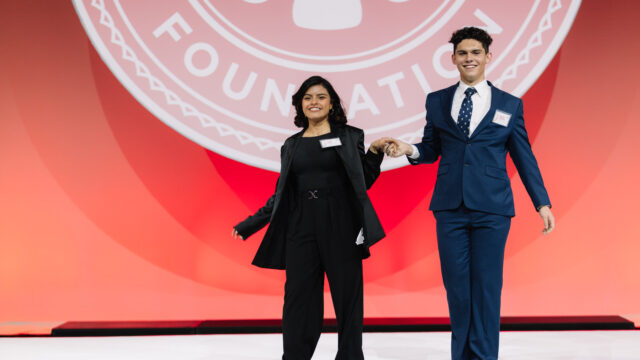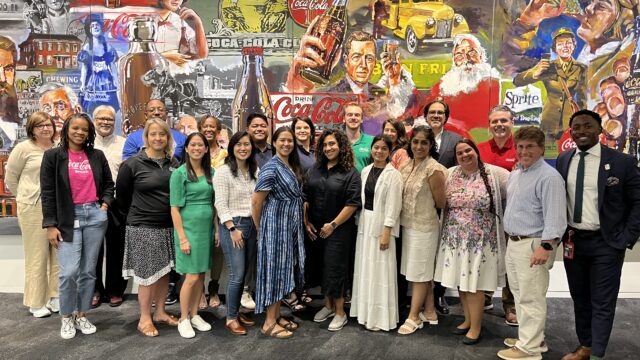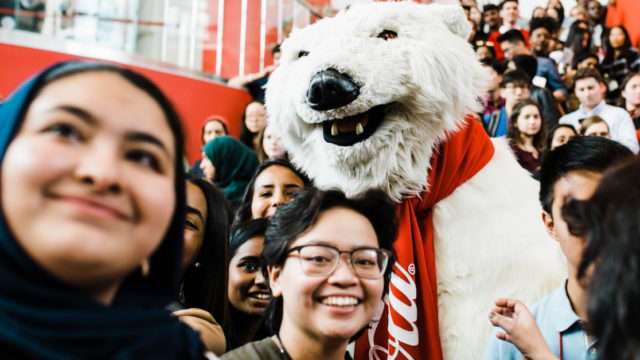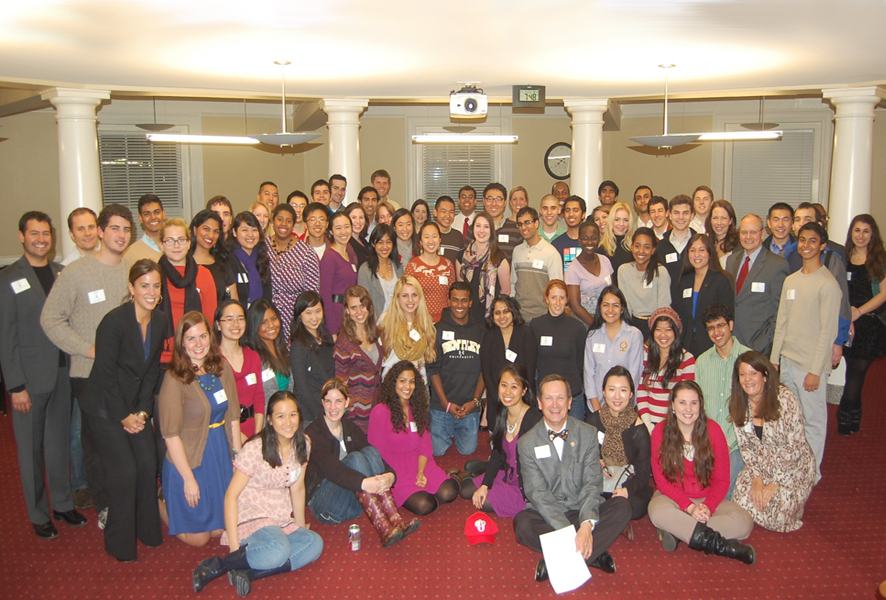
Celebrating 25 Years with CCSF: Looking Ahead with Mark Davis
On December 21, 2012, Mark Davis celebrated 25 years with the Coca-Cola Scholars Foundation.
In the first installment of a two-part series, 1989 Scholar Carrie Regan spoke with our fearless president about how he ended up with CCSF, the history of the organization, what he has learned from the Scholars he’s met (that’s every single one of them!), and more.
Now, in this second installment of Carrie’s interview with Mark, find out who his “dream” speaker would be at the Scholars Banquet, what his midlife crisis prompted him to do, and how he plans to stay connected once he (gasp!) retires.
Carrie: Let’s start with your personal hobbies. With your Grand Canyon traverse, mountaineering, and backcountry camping, your feats of physical endurance and outdoorsmanship are legendary. What was the origin of that interest and how would you say these accomplishments have made you a better leader?
Mark: (Laughs) They’re legendary only in my mind! My interest started at a pretty early age. I always enjoyed camping in the mountains of north Georgia and hiking the Appalachian Trail, but after college, work, and family took over my time, I lost that connection to the outdoors.
As I was turning 40, I had a midlife crisis. I knew I needed to get back in the outdoors, so I decided to climb California’s Mt. Whitney. Once I did that on Whitney, I was hooked. Now I’ve been all through the Sierras, Cascades, Rocky Mountains, White Mountains, and in recent years I’ve gotten interested in canyons, whether it’s Bryce Canyon, Zion, or the Grand Canyon.
I think it has changed the way I interact with people. I always have a guide on technical climbs that are particularly dangerous. The best guides lead from behind. They let you feel like you are leading everyone up the mountain, even though they are leading through the suggestions they are making. There are times when they need to take the front of rope and say, “Follow me, step exactly where I step, and don’t do anything else,” and you have to do that. Knowing when to do that and when to let others take on the role of being the leader on the rope is a completely different perspective from the traditional “I’m out front, follow me” view of leadership. That ability to lead from behind and offer suggestions—I think a lot of that came from my experience in the mountains.
Carrie: What adventures are still on your to-do list?
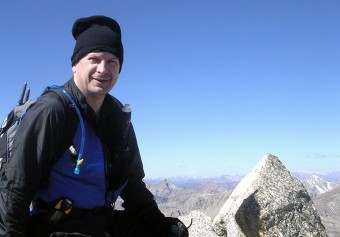 Mark: There are so many places I want to go. I never should have started on Colorado, because I’m still only two thirds of the way through all of those 14’ers. Ecuador, Kilimanjaro … I’d love to spend some time in the Himalayas, it’s just a matter of time and resources, what I can get to first. I’m getting to that point of retirement when I can say, “I can do all those things on my to-do list.”
Mark: There are so many places I want to go. I never should have started on Colorado, because I’m still only two thirds of the way through all of those 14’ers. Ecuador, Kilimanjaro … I’d love to spend some time in the Himalayas, it’s just a matter of time and resources, what I can get to first. I’m getting to that point of retirement when I can say, “I can do all those things on my to-do list.”
Carrie: Nooo! (Mark laughs) On that note, you’ve often said that you’ll retire when we have the first legacy Scholar—a child of a Coke Scholar who becomes a Coke Scholar. This year I understand that we’ve had not one but two legacy applicants. Do we need to find and destroy those applications?
Mark: (Laughs) I don’t think their parents would appreciate it. It really does call attention to the fact that this program has been around for a full generation. We have at least two legacy applicants that we know about and there may be more. Maybe I’ll have to fudge a little on my retirement plans. Maybe I can say, “Well, now, it needs to be when the legacy Scholars graduate from college.” Maybe I can get a few more years that way.
I never expected to be here for 25 years. It’s been a special, special thing for me. Hopefully I’ll get a few more years in.
Carrie: Before you retire, who’s the person you’ve dreamed of inviting to speak at the Scholars Weekend banquet but haven’t gotten yet?
Mark: I would love to get Warren Buffet. He embodies so much of what it means to be a good citizen. He’s been a man of integrity, made a fortune, then said, “That was fun—I think I’ll give it away to charity.” He embodies that intersection of the private sector and the charitable nonprofit world.
Carrie: How will you survive each year when April rolls around and you’re not reading applications and meeting Scholars?
I hope that when I retire I’ll get invited to be part of the Selection Committee and interview Scholars. I’ve never experienced that. We’ve always treated it as sacrosanct—what goes on in that room stays between committee members and the students. So maybe when I retire I’ll get that chance to sit in there and ask questions. I’d enjoy that.
Carrie: What would you like to see happen in the next 25 years?
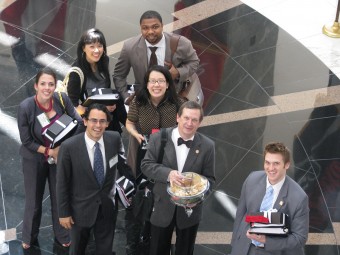 Mark: In another 25 years, there will be 11,000 alumni … and the weird thing is that 25 years from now, our first class of Coke Scholars will be reaching retirement age (Carrie gasps). I’ve shared many times with our board of directors that you can’t measure our success when the student wins our scholarship, or even when they graduate. It’s 20 years later when they’re taking on these leadership roles in their careers and communities that you know you’ve had some measure of success.
Mark: In another 25 years, there will be 11,000 alumni … and the weird thing is that 25 years from now, our first class of Coke Scholars will be reaching retirement age (Carrie gasps). I’ve shared many times with our board of directors that you can’t measure our success when the student wins our scholarship, or even when they graduate. It’s 20 years later when they’re taking on these leadership roles in their careers and communities that you know you’ve had some measure of success.
In terms of what I would want to see in the way of programming, there are two immediate things that come to mind that the Alumni Advisory Board is considering: a more formalized mentoring program, where if you wanted to be a mentor or mentee there would be a structured plan in place, and a mini grant program, where Scholars make applications to us, and we have the Alumni Advisory Board review them in some fashion and decide how much to give to these Coke Scholars to utilize for programs in their communities.
The exciting thing is that with continued engagement, we’re going to make the experience of being a Coca-Cola Scholar much more powerful for each subsequent class.
Carrie: What would you like your legacy to be upon leaving?
Mark: I just hope people would say, “He really cared about this program, and wanted to see it be successful.”
I think we’ve had a lot of successes. I hope every Coke Scholar appreciates what it means to be a Coke Scholar. I relish the fact that I’ve had the chance to meet every single one of them. I think knowing that we’ve created something that’s special, not only in our minds but in the minds of the 5,000 alumni who are out there—and in the minds of the other scholarship programs who have modeled their programs after us— that’s the kind of legacy I’d like to have.


